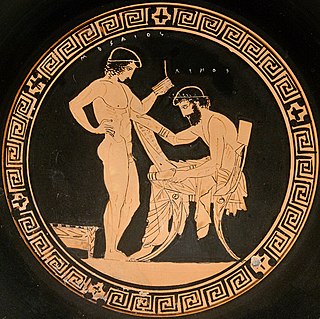Related Research Articles
In Greek mythology, Proetus may refer to the following personages:
In Greek mythology, Danaus was the king of Libya. His myth is a foundation legend of Argos, one of the foremost Mycenaean cities of the Peloponnesus. In Homer's Iliad, "Danaans" and "Argives" commonly designate the Greek forces opposed to the Trojans.

In Greek mythology, Phoroneus was a culture-hero of the Argolid, fire-bringer,law giver, and primordial king of Argos.
In Greek mythology, Sthenelus was a name attributed to several different individuals:
In Greek mythology, Adrastus or Adrestus, , was a king of Argos, and leader of the Seven against Thebes. He was the son of the Argive king Talaus, but was forced out of Argos by his dynastic rival Amphiaraus. He fled to Sicyon, where he became king. Later he reconciled with Amphiaraus and returned to Argos as its king.
Alcathous was the name of several people in Greek mythology:
In Greek mythology, Linus may refer to the following personages:

The Seven against Thebes were seven champions in Greek mythology who made war on Thebes. They were chosen by Adrastus, the king of Argos, to be the captains of an Argive army whose purpose was to restore Oedipus' son Polynices to the Theban throne. Adrastus, although always the leader of the expedition against Thebes, was not always counted as one of the Seven champions. Usually the Seven were Polynices, Tydeus, Amphiaraus, Capaneus, Parthenopaeus, Hippomedon, and Adrastus or Eteoclus, whenever Adrastus is excluded. They tried and failed to take Thebes, and all but Adrastus died in the attempt.

The Thebaid is a Latin epic poem written by the Roman poet Statius. Published in the early 90s AD, it contains 12 books and recounts the clash of two brothers, Eteocles and Polynices, over the throne of the Greek city of Thebes. After Polynices is sent into exile, he forges an alliance of seven Greek princes and embarks on a military campaign against his brother.
In Greek mythology, Arion or Areion, is a divinely-bred, fabulously fast, black-maned horse. He saved the life of Adrastus, king of Argos, during the war of the Seven against Thebes.
In Greek mythology, Agenor was a member of the royal house of Argos. He belonged to the house of Phoroneus, and was father of Crotopus. His exact position in the lineage varies depending on the source.
In Greek mythology, AgenorAgenor was a Psophian prince.
In Greek mythology, Carnus was a seer from Acarnania, who was instructed in the art of divination by Apollo. According to the poet Praxilla, he was a son of Europa, who was brought up by Apollo and Leto. Alternatively, he was Apollo's lover and friend in some accounts.
In Greek mythology, Argus was the king and eponym of Argos.
Psamathe, sometimes given only as the daughter of Crotopus, was the daughter of King Crotopus of Argos, who became the lover of the god Apollo.
In Greek mythology, Triopas or Triops was the seventh king of Argos. Triopas may be an aspect of the Argive Zeus, or may be his human representative.

In Greek mythology Linus was a reputed musician and master of eloquent speech. He was regarded as the first leader of lyric song.
In Greek mythology, Linus, son of Apollo and Psamathe, daughter of King Crotopus of Argos.
In Greek mythology, Pelasgus also known as Gelanor, was an Inachid king of Argos.
References
- Citations
- 1 2 Eusebius . Praeparatio evangelica, 10.9.8; 10.11.2, 10.12.1-3; Chronography, 66
- ↑ Pausanius. Description of Greece, 1.43.7; 2.16.1; 2.19.8
- ↑ Frazer, J. G. (tr.), ed. (1898). Pausanias's Description of Greece. Vol. II. London: Macmillan. pp. 536–537.
- 1 2 Conon, Diēgēseis [Narratives] 19, summarized by Pache (2004), pp. 66–77 and Frazer (1898), III: p. 536. [3]
- ↑ Pausanias, translated by Jones, W.H.S.; Ormerod, H.A., Description of Greece , 1. 43. 7 - 8
- ↑ Statius, Thebaid, 1.557, quoted in: Ogden, Daniel (2013-05-30). "10 Lamia, Slain by Eurybatus and Others". Dragons, Serpents, and Slayers in the Classical and Early Christian Worlds: A Sourcebook. Oxford University Press. pp. 100–101. ISBN 9780199925117. ISBN 0199323747
- ↑ A Dictionary of Greek and Roman Antiquities s.v. Arnis . William Smith, LLD. William Wayte. G. E. Marindin. Albemarle Street, London. John Murray. 1890.
- ↑ Myers, P; Espinosa, R; Parr, C. S; Jones, T; Hammond, G. S; Dewey, T. A. "ADW: Euselasia crotopus: CLASSIFICATION". animaldiversity.org. Retrieved 10 November 2016.
- Bibliography
- Pache, Corinne Ondine, ed. (2004). "Linos and Demophone". Baby and Child Heroes in Ancient Greece. University of Illinois Press. pp. 66–77. ISBN 9780252029295. ISBN 9780252029295